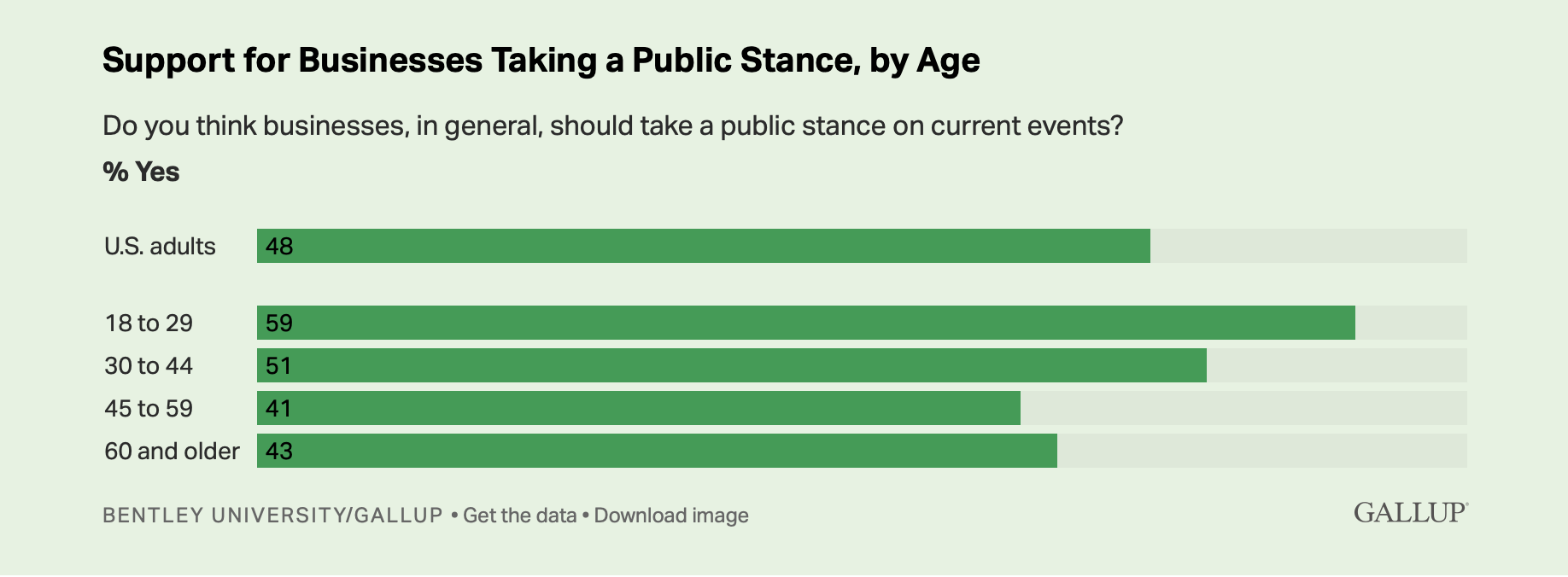New Forms of Activism Make Crisis an Everyday Expectation
A recent Gallup poll shows US adults are split on whether companies should take a political or social stance, with 48% believing they should and 52% saying they should not. Younger Americans are demanding businesses have a solid moral compass, with a significant majority saying companies should focus on long-term social benefits; promote diversity, equity, and inclusion; and create opportunities for low socioeconomic groups. Older Americans, on the other hand, don’t agree. There’s up to a 20% delta between the two.
So how are leaders expected to navigate the fine line between managing differing views and expectations across their employee, customer, and consumer base? How do you ensure you are prepared to mitigate issues so they don’t become crisis?
Ruder Finn gathered insights from 10 senior communication experts from Fortune 100 companies, a leading national interest group and a top government agency to exchange experiences of managing the continual headwinds of the culture wars and activism. Coupled with my recent experiences managing some high-profile crisis situations, below are six lessons:
Consider crisis to be an everyday expectation: Even seemingly benign actions can activate outrage among audiences that could ultimately lead to a crisis. Understanding that any stance you take has the potential to become polarizing can help communicators prepare for all outcomes. Having clear guidance about what your brand[s] stand for, knowing the level of risk tolerance among leadership, and ensuring broad stakeholder buy-in for decisions made, will enhance the confidence needed to hold your ground if a crisis is triggered.
Scenario planning is not enough. It’s increasingly difficult to anticipate what’s going to trigger activism. That’s why your strategic approach should move from crisis preparedness to crisis readiness. Start by having active contracts in place for resources needed to mitigate a crisis because it can be the difference between controlling the narrative and fanning the flame.
Be prepared to win and lose. With the public divided nearly 50/50, accept that your actions could alienate some of your stakeholders and that the outcome may be just as equal.
Don’t assume your employees understand where you stand. With opposing expectations around the role companies should play in society, overcommunicate to your employees so they know why you are or aren’t taking a stand. You’ll have supporters and detractors, but most will respect your choices when they understand the reasons behind them. Communications needs to either come from the top or designate a leader to be the voice of the decision and ensure consistency in what you’re saying. Plan for any internal communications to be flipped externally.
Size the crisis: Use technology to get real-time data that enables you to effectively track the narrative and where the conversation is going – or if it is dying out. Empower a tight cross functional team to determine if a reaction is needed – or not.
Build advocates when you are in a good place. Detractors are louder than supporters, so build your supporter base well ahead of a potential crisis. Have an informal contract – or understanding – that your advocates will, at minimum - not speak out against you and possibly support you when under attack. It's important to have prepared statements, key messages, and video content as reinforcements.
As we head into a presidential election year, the road ahead will get bumpier, more difficult to navigate and challenging to predict when an issue will trigger a crisis. Be ready for anything and understand that even if you manage the situation well, your best outcome may be that you both win and lose.


